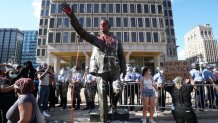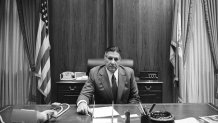The bronze statue of controversial Philadelphia mayor and former police commissioner Frank Rizzo will be removed from its prominent location in the city's municipal core in a few weeks.
Mayor Jim Kenney said Sunday that the city is accelerating efforts to remove the effigy from the steps of the Municipal Services Building across from City Hall "by another month or so."
Rizzo has a divided history among Philadelphians. Some see him as a devoted public servant while to others he represents systemic racism and brutality against minority communities.
The 10-foot sculpture, which was installed in 1999, has represented a cultural flash point for racial tensions in the city – akin to sculptures of confederate leaders in southern states. It was defaced several times before Saturday's violent demonstrations. Attempts to physically pull it down also failed several times.
Protestors on Saturday defaced the statue once again with graffiti and made an attempt to yank it off the steps. The statue was cleaned on Sunday. Kenney said no special efforts were made to clean it.

Kenney said the city was planning to move the statue when Dilworth Park was renovated, but that was delayed because of how the statue was engineered. The statue is drilled into the plaza and concourse below, which is where city services like obtaining permits take place. The cost to remove it will total hundreds of thousands of dollars, Kenney said, which is why the city was waiting for an overall renovation project to make the move.
Local
Breaking news and the stories that matter to your neighborhood.
"I never liked that statue. I don't think it's been deserved in the first place and I didn't put it there," Kenney said Sunday.
Rizzo's critics, many of them people of color, recall his approach to policing and governing as corrupt and racist. The South Philadelphia native served as mayor from 1972 to 1980 and is remembered by supporters as a devoted, outspoken public servant who championed the city.
Rizzo became police commissioner in 1967, memorably responding to a disturbance at a housing project wearing a tuxedo with a nightstick tucked into his cummerbund. He served two terms as mayor as a Democrat before switching to the GOP.
His four-year stint as commissioner was marked by praise for crime-fighting and criticism for rights infringement and was punctuated by some confrontations with African-Americans. In 1967, Rizzo and the police confronted a few hundred black students protesting outside the Board of Education Building. Officers clubbed some of the students after a few climbed atop cars. In 1970, two groups affiliated with the Black Panthers were raided and strip-searched on the sidewalk.
Yet he's also credited with hiring large numbers of African-American officers and promoting several black officers during his stint as commissioner.




